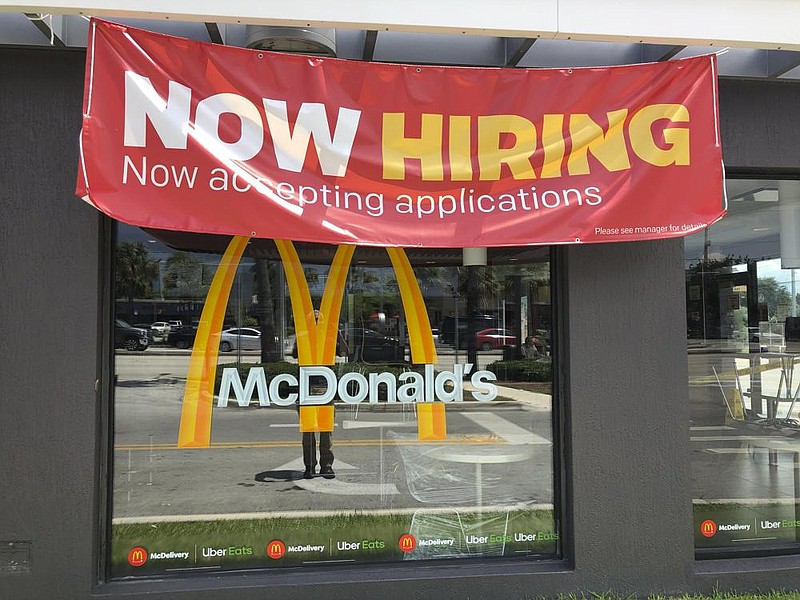Another 1.3 million people people filed for unemployment for the first time last week, a decrease of 99,000 from the week before, as novel coronavirus cases and closures surged around the country, according to data released Thursday by the Department of Labor.
The number of new state unemployment filings has remained above a million each week since the pandemic began in mid-March. That number has averaged about 1.4 million the past four weeks, roughly double the pre-pandemic weekly record.
In addition, states reported that another 1 million claims were made under the federal Pandemic Unemployment Assistance program, which grants jobless benefits for gig workers, self-employed workers and contractors, the agency reported.
Continuing claims -- the total number of Americans claiming ongoing unemployment benefits in state programs -- declined to 18.1 million in the week ended June 27. Those figures are reported with a one-week lag.
[CORONAVIRUS: Click here for our complete coverage » arkansasonline.com/coronavirus]
When combined, the two numbers for initial unemployment claims have ticked up the past three weeks, from 2.24 million in mid-June to 2.44 million last week.
Jobless claims "are stalled out at a new normal of over a million new claims every week," said Daniel Zhao, an economist at Glassdoor. "The virus is in the driver's seat and we're along for the ride until the current public health crisis is resolved."
The numbers for the first few days of July come as rising cases of coronavirus infections have hit states and counties nationwide, touching off a new round of closures and restrictions and sending some workers back to the unemployment insurance queue for the second time in just a few short months.
"The bad news is that initial claims are still historically very high and they suggest that damage is continuing to accumulate in the economy," Adam Ozimek, chief economist at Upwork, said in an interview.
The unemployment rate, which is tabulated separately from the weekly jobless claims, has trended downward the past two months, to 11.1% last month, as many laid off or furloughed workers in industries like food service and retail were called back to work. Yet a rising number of workers have reported permanent layoffs.
SECOND WAVE
And the jobless statistics don't capture the damage from the new round of cases yet.
"All these factors look more like an economy that is riding into a recession than out of one," Ozimek said. "At this stage in the game, when we're this far from initial shock, it becomes less likely that new layoffs are the types of jobs that snap back."
Several companies have warned in recent days that more layoffs are coming. Levi's, the iconic jeans maker, said it will cut 700 corporate jobs. United Airlines has warned 36,000 of its employees -- nearly 40% of its workforce -- that they might be furloughed in October. (Airlines aren't allowed to cut jobs until then as a condition of accepting billions of dollars in government rescue aid.) Motorcycle maker Harley-Davidson said it will eliminate 700 corporate jobs.
The pandemic drove Walgreens to a deep loss in the most recent quarter, with customers staying home or limiting shopping to essential supplies from grocery stores. Walgreens will cut 4,000 jobs at its pharmacy chain Boots in the United Kingdom. Bed Bath & Beyond said it will close 200 stores over the next two years as its sales have slid.
There are many workers like Samantha Hartman, 29, whose temporary layoff -- she was furloughed in March from Rosen Hotels & Resorts, the hospitality company she works for in Orlando -- became permanent this week.
Hartman said her supervisor called her this week to tell her that the company had tried to come up with a way to keep employees but found their hands tied with almost no business coming in.
"Everything is up in the air," Hartman said. "I fully expect not to find another job in this industry."
The company, which received a Paycheck Protection Program small business loan of more than $6 million according to the Orlando Sentinel, announced Wednesday that it would lay off a "substantial" amount of its workforce by July 31.
Hartman, who has a heart condition, said the company is letting her keep her health care through August. She moved to Orlando two years ago for the job. Now, she says she'll probably move back with her family in California when her lease is up next year.
GRIM OUTLOOK
Plunging consumer demand amid the virus' surge and ensuing shutdowns have shuttered businesses across the country. Bed Bath & Beyond announced it would close 200 stores; Brooks Brothers, which filed for bankruptcy protection this week, said it would close 51 stores.
And there's a grim waiting game for what are expected to be widespread layoffs in state and municipal governments, as budgets are drastically pared to meet declining tax revenue.
Initial weekly jobless claims remain well above the record before the pandemic, of 695,000 in 1982. They have dropped every week since the peak of 6.9 million, from a week in late March, but have plateaued for more than a month.
The renewed threat of job losses is arising just as a federal program that provides $600 a week in unemployment benefits, on top of whatever jobless aid each state provides, is to expire at the end of this month. Congressional leaders have said they will take up some form of a new rescue package when lawmakers return later this month from a recess.
Administration officials have expressed support for additional stimulus. But Senate Republicans have opposed extending the $600 a week in unemployment benefits, mainly on the ground that it discourages laid-off people from returning to work. House Democrats have pushed to extend the $600 a week through January.
Information for this article was contributed by Eli Rosenberg of The Washington Post, by Christopher Rugaber and Wayne Parry of The Associated Press, and by Reade Pickert of Bloomberg News.

